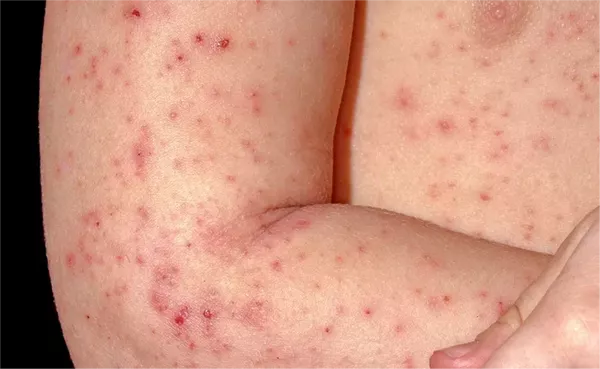Eczema, also known as atopic dermatitis, is a common skin condition that causes dry, itchy, and inflamed skin. Understanding the triggers that can worsen eczema is crucial for managing symptoms and maintaining skin health. This article will explore various eczema triggers in detail, helping you identify what may cause flare-ups and how to avoid them.
What Is Eczema?
Eczema is a chronic condition that affects millions of people worldwide. It can occur at any age but often starts in childhood. The symptoms include:
- Dry, itchy skin
- Red or brownish-gray patches
- Thickened, cracked skin
- Small, raised bumps that may leak fluid when scratched
Eczema can be uncomfortable and frustrating, but identifying triggers can help in managing the condition effectively.
Understanding Eczema Triggers
Eczema triggers are factors that can lead to flare-ups or worsen existing symptoms. These triggers can vary from person to person, making it important to pay attention to individual responses. Common triggers include:
- Irritants
- Allergens
- Climate and weather
- Food
- Stress
- Hormones
Let’s explore each of these categories in detail.
Irritants
Irritants are substances that can directly damage the skin, leading to irritation and inflammation. Common irritants include:
Soaps and Detergents
Many soaps, detergents, and cleaning products contain harsh chemicals that can strip the skin of its natural oils. This can lead to dryness and exacerbate eczema symptoms.
Fragrances and Dyes
Products with strong fragrances or dyes can irritate sensitive skin. It’s best to choose fragrance-free and dye-free options.
Wool and Synthetic Fabrics
Certain fabrics, especially wool and synthetics, can irritate the skin. Opt for soft, breathable materials like cotton.
Household Chemicals
Household cleaning products and chemicals can also trigger flare-ups. Use natural cleaning products or wear gloves when handling strong cleaners.
Allergens
Allergens can cause the immune system to react, leading to inflammation and itchiness. Common allergens include:
Dust Mites
Dust mites are tiny creatures that thrive in bedding, carpets, and upholstery. Regular cleaning and using dust-proof covers can help reduce exposure.
Pollen
Pollen from trees, grasses, and weeds can trigger allergic reactions. During peak pollen seasons, keep windows closed and use air purifiers.
Pet Dander
Pet dander, the tiny flakes of skin from animals, can be a significant trigger for many people. If you are allergic, consider limiting contact with pets.
Mold
Mold can grow in damp areas, like bathrooms and basements. Regular cleaning and using dehumidifiers can help control mold growth.
Climate and Weather
The environment plays a significant role in eczema management. Different weather conditions can trigger flare-ups:
Hot Weather
Heat and humidity can cause sweating, leading to itchiness and discomfort. Stay cool and wear loose-fitting clothing in hot weather.
Cold Weather
Cold, dry air can strip moisture from the skin. It’s essential to keep the skin moisturized and covered during winter months.
Dry Air
Indoor heating can create dry air, which may worsen eczema. Use a humidifier to add moisture to the air, especially during the winter.
Food
Certain foods can act as triggers for some individuals. Common food-related triggers include:
Dairy Products
Dairy can cause flare-ups in some people, especially children. If you suspect dairy is a trigger, consider eliminating it from your diet for a few weeks and monitor your skin’s response.
Eggs
Eggs are another common allergen. Avoiding eggs may help reduce eczema symptoms for those affected.
Nuts and Peanuts
Nuts, especially peanuts, are known to trigger allergic reactions in some people. Be cautious and consult with a healthcare professional if you suspect a nut allergy.
Wheat and Gluten
Some individuals report worsening eczema symptoms when consuming wheat or gluten-containing products. Try keeping a food diary to track your diet and symptoms.
Stress
Stress is a significant factor that can exacerbate eczema. When you’re stressed, your body produces more cortisol, which can lead to inflammation. Here are some ways to manage stress:
Relaxation Techniques
Practices such as meditation, yoga, and deep-breathing exercises can help reduce stress levels.
Regular Exercise
Physical activity can help alleviate stress and improve overall health. Aim for regular exercise that you enjoy.
Adequate Sleep
Lack of sleep can increase stress levels. Aim for 7-9 hours of quality sleep each night to help manage stress effectively.
Hormones
Hormonal changes, particularly in women, can affect eczema symptoms. Fluctuations during menstruation, pregnancy, or menopause can trigger flare-ups.
Menstrual Cycle
Some women notice a worsening of eczema symptoms before or during their menstrual cycle. Keeping track of symptoms in relation to your cycle can help identify patterns.
Pregnancy
Pregnant women may experience changes in eczema symptoms. Consult with a healthcare provider to find safe treatment options during pregnancy.
How to Manage Eczema Triggers
Identifying triggers is the first step in managing eczema effectively. Here are some strategies to help:
Keep a Diary
Maintain a diary to track your eczema symptoms and potential triggers. Note the foods you eat, products you use, and any environmental factors.
Moisturize Regularly
Keeping the skin moisturized is crucial. Use thick creams or ointments, especially after bathing, to lock in moisture.
Avoid Scratching
Scratching can worsen eczema and lead to infection. Keep nails short and consider wearing gloves at night if scratching is a problem.
Consult a Dermatologist
If eczema is severe or difficult to manage, consult a dermatologist. They can provide personalized treatment options and may recommend topical medications or other therapies.
Conclusion
Eczema triggers can vary widely from person to person. By understanding and identifying these triggers, individuals can take proactive steps to manage their symptoms effectively. Keeping a diary, moisturizing regularly, and consulting healthcare professionals can make a significant difference in the quality of life for those living with eczema. Remember, while eczema can be challenging, effective management is possible with the right strategies and support.
Related topics:

























